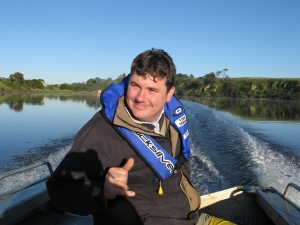Viral outbreak
Research news
A Deakin researcher has discovered a new virus affecting zooplankton in Victoria’s south west estuaries that could have serious consequences for food chains in the area, and beyond.
Deakin post-graduate researcher Dr Ben Roennfeldt, from Deakin’s School of Life and Environmental Sciences (Warrnambool), discovered the marine virus as part of his PhD research.
Dr Roennfeldt began his PhD on fish larvae in the Hopkins River estuary, but his discovery of the virus took his research along a different trajectory – that fully challenged his sleuthing skills.
“After I saw iridescent blue copepods in my samples, I undertook a process of elimination to decipher why the animals were blue. The initial process involved a literature review and contacting zooplankton taxonomists,” he said.
“Then, another student suggested I research insect viruses, which were known to change the colour of their hosts. After reviewing literature on insect viruses, I concluded that viral infection was the cause.”
Dr Roennfeldt then contacted the Australian Animal Health Laboratories (AAHL), where electron microscopists validated the viral infection. Working with colleagues, he then began to uncover the virus’s genetic identity.
The virus that Dr Roennfeldt discovered affects a group of tiny crustaceans called copepods. After his initial finding, he discovered that zooplankton in other environments, in both ocean and freshwater ecosystems, were also affected.
“Because zooplankton are near the bottom of the food chain, fluctuations in their populations are subsequently relayed through the food chain and impact the phenology of the ecosystem,” he said.
“They provide food for fish larvae, as well as small fish such as pilchards and small crustaceans, and even some whale species.”
Zooplankton are tiny animals that live near the surface of water and drift along with the current. They include the larval form of larger animals such as sea urchins, lobsters, sea stars, snails and most fish.
Dr Roennfeldt said that controlling the virus would be virtually impossible.
“It’s not possible to vaccinate zooplankton in global marine and freshwater environments. I expect that these viruses have probably been present in zooplankton populations for millennia and they will remain into the future. Therefore, we need to adapt by managing for the impacts of zooplankton viruses and diseases as they arise,” he said.
He attributes climate change and stress in the temperate ecosystems as influential on virus outbreaks, including virus transmission.
“Because viruses are usually quite host-specific, humans are generally not affected in any way by invertebrate viruses. We probably unknowingly eat thousands of viruses each day in our food, from dietary plants and animals,” he said.
For the aquatic food chain, however, it is a very different story.
“As important prey for larvae, zooplankton drive recruitment in the key fisheries across the globe that, in turn, support higher trophic level species,” said Dr Roennfeldt.
“Starvation of larval fishes occurs when their prey is not readily available, leading to poor recruitment in affected fisheries; and vice-versa. Thus the effects on the food chain have the potential to be large, particularly when disease is widespread across zooplankton populations.”
Dr Roennfeldt has developed a passion for viruses and zooplankton. He hopes to continue in the new field of research that he contributed to developing.
Share this story
 Zooplankton expert, Dr Ben Roennfeldt.
Zooplankton expert, Dr Ben Roennfeldt.
